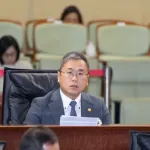Copyright macaudailytimes

The newly elected lawmaker, Leong Pou U, representing the Macau Federation of Trade Unions, has called for the immediate transformation of the Non-Mandatory Central Provident Fund System, which is administered by the Social Security Fund (FSS), into a mandatory system, merging it with the already existing mandatory system. The call was made at the Legislative Assembly (AL) on Tuesday, prior to the agenda of the two-day plenary session that ended yesterday. Lawmaker Leong recalled that currently, FSS revenues come mainly from the government, including gaming contributions, the 1% share of revenues from each year’s general budget, and 3% from the central budget execution balance. “In 2024, total revenues from the three aforementioned sources accounted for 46.78% of total FSS revenues, and total investment revenues represented another 47.52%, while beneficiaries’ contributions accounted for only 2.87%,” he said. “FSS revenues are overly dependent on government money injections, which do not favor its sustainable and healthy development. The principle of sustainability is one of the most important principles of the social security system, and it means that social security must, on the one hand, guarantee the basic living needs of current generations and, on the other hand, take into account the social security needs of future generations,” the lawmaker said. Leong also remarked that the current system is based on the concept of “joint responsibility, rational participation, joint construction, and joint sharing,” claiming that it is time for the government to assume its responsibilities and leadership role in enforcing a social security system that is equal and fair for all residents. Leong pointed out that implementing the Social Security System and the Non-Mandatory Central Provident Fund System provides a solid legal guarantee for creating a two-tier social security system with Macau characteristics. However, some workers still do not benefit from this system. “Therefore, depending on the economic situation, I hope the government will promptly convert the non-mandatory central provident fund into a mandatory one so that all workers can enjoy two-tier post-retirement guarantees.” Half a year ago, when the Address for 2025 was debated, Leong’s predecessor in the AL seat (Lei Chan U) raised the same matter to the government. At the time, the vice president of the administrative committee of the FSS, Chan Pou Wan, responded that the idea of transforming the Non-Mandatory Central Provident Fund System into a mandatory one had been postponed for an undefined period. At the AL, Chan said this would not be considered “until the economy fully recovers from the impacts of the pandemic.” She further explained that this decision to postpone the transformation of the non-mandatory into a mandatory system was due to concerns from business owners, particularly small and medium-sized enterprises (SMEs), about the impacts of introducing such a measure. “SMEs are still struggling, and there are many concerns. Business owners have expressed many concerns over this measure,” Chan said, revealing also that for the new government, the baseline that serves as a measure of economic recovery is the situation back in 2019. “We will only have updates on this when the economy returns to the 2019 level,” she added, hinting that the same indicator also serves as a reference for the government on the increase of other social benefits such as elderly pensions and the subsistence index, among others. The Non-Mandatory Central Provident Fund System was created in 2018 to complement the existing Social Security System. It allows employers and employees to voluntarily create joint contribution pension funds. At the time, the government noted that this would be a first step to making the system mandatory for all. The government ordered a study at the University of Macau to determine when it would be the right time to enforce this change and transition the different private funds into a single fund that would cater to all residents. According to the study, the mandatory system should have been implemented three years after the creation of the non-mandatory system (2021), but due to concerns related to the pandemic and economic challenges, it was established that there will be a new analysis period between 2021 and 2023, aiming to enforce the mandatory system by 2026. During this period, the primary task of the government officials was to convince the major employers in Macau (namely, the gaming concessionaires) to include their private retirement funds in this system so that a reasonable basis would be established for later allowing the smoother entry of the smaller companies. In simple words, the idea is that all employers and their workers would contribute to the fund with a monthly percentage. In the case of the workers, the employer would deduct this percentage from their monthly salary and add a similar amount on their behalf. The total would then be handed over to the government as an FSS contribution, with the workers being able to benefit from the amounts deducted once they reach retirement age, which adds the revenues resulting from the investment of the fund balance. In practical terms, this system would mean that workers would receive a monthly salary cut (deduction) and that the employer would have to shoulder the extra cost related to their share. In the current non-mandatory system, the minimum employee contribution is 5% of the basic salary, with the employer required to contribute at least the same amount. However, employers can set their contribution rates, which may be a uniform percentage, vary based on years of service, or differ based on staff category. Some employers, particularly in public service, have a fixed total contribution rate of 21% (7% from the employee and 14% from the government).



